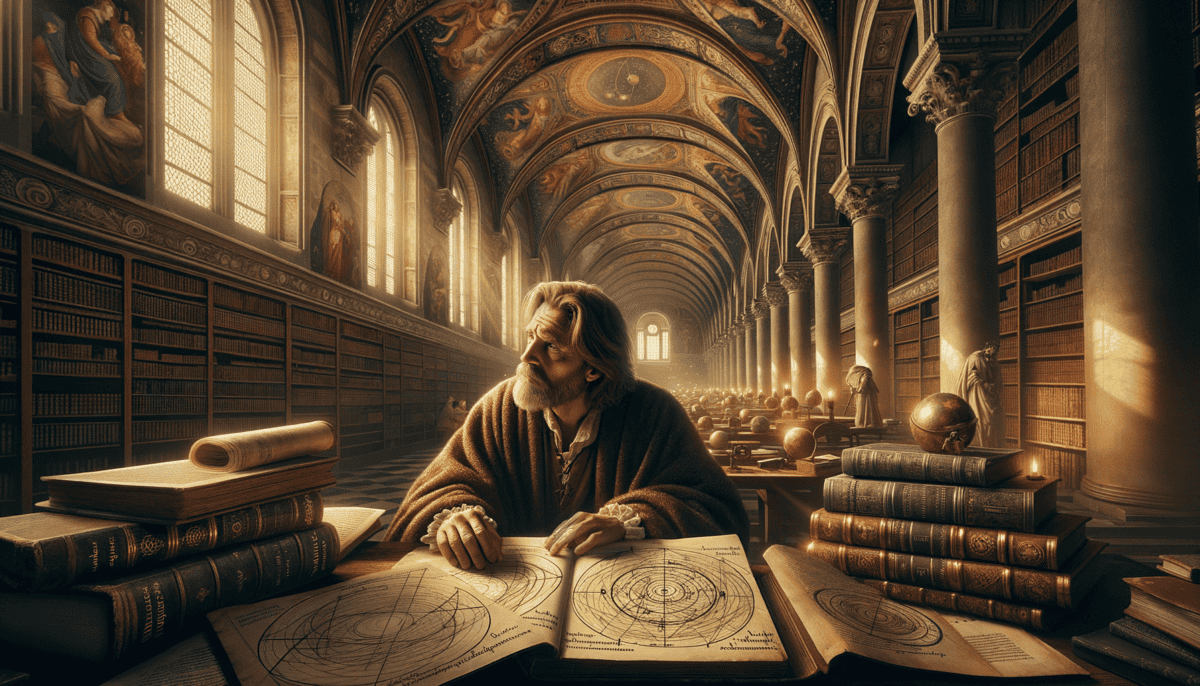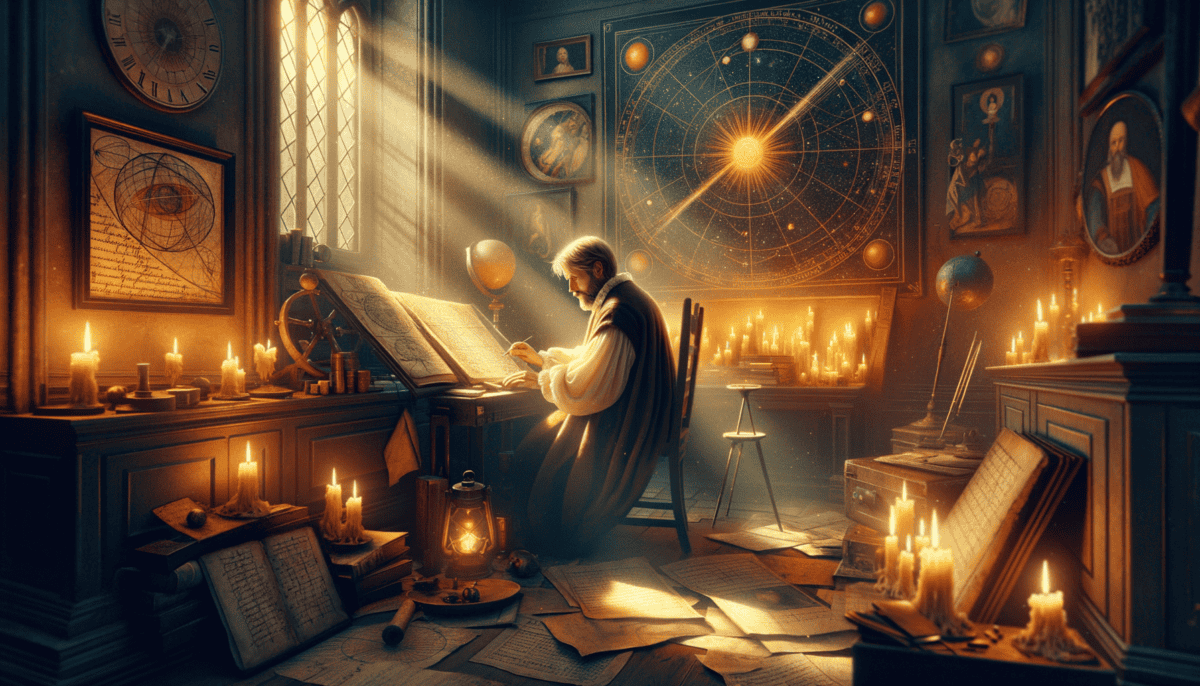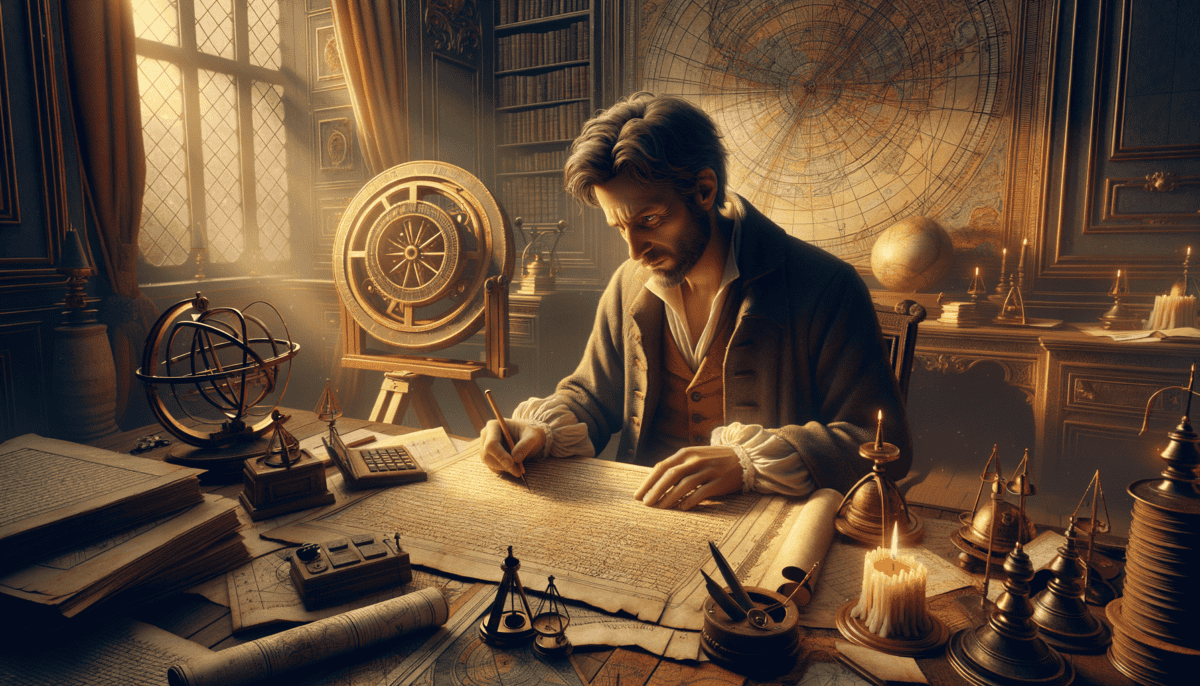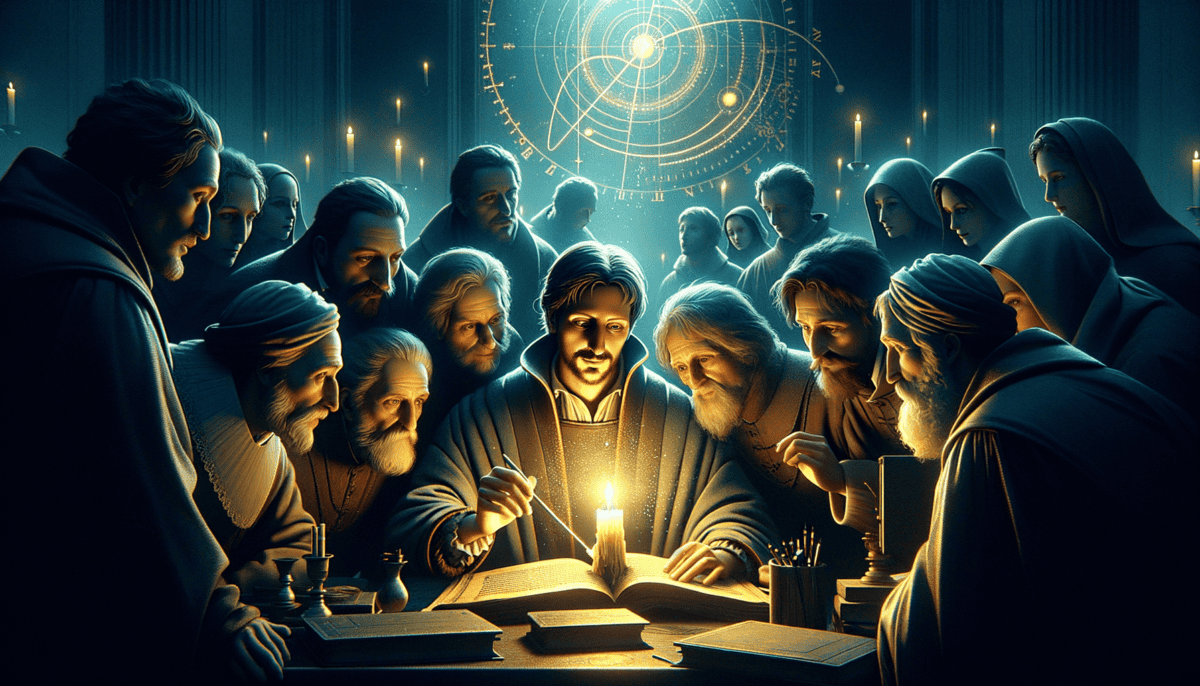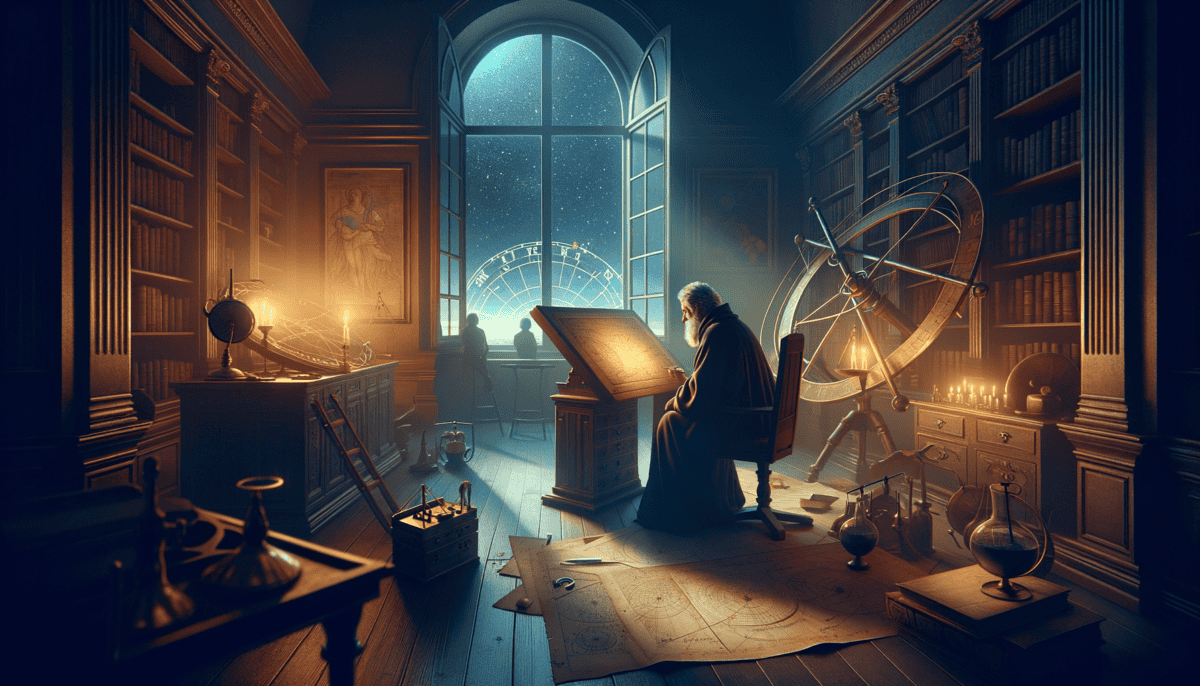A Night Under the Stars
Young Nicolaus pressed his nose against the cold window of his uncle's tower, his eyes wide with wonder. The twinkling stars above Toruń painted the night sky like tiny diamonds. It was 1483, and the ten-year-old boy couldn't help but feel that the universe was trying to tell him something.
"Uncle Lucas, why do the stars move across the sky?" Nicolaus asked, his voice filled with curiosity.
His uncle, Bishop Lucas Watzenrode, smiled warmly. "That's because the Earth stays still while everything in the heavens moves around us, dear boy."
But something about that answer didn't quite feel right to young Nicolaus.
The tower room was cozy, filled with strange and wonderful instruments. There were brass devices called astrolabes that measured the positions of stars, and maps covered in mysterious symbols. These tools would become Nicolaus's first friends in his journey to understand the sky.
Special Note: Nicolaus Copernicus was born into a family that valued learning. His father was a merchant, and his uncle was an important church leader who loved science.
"Come here," Uncle Lucas beckoned, pointing to a large book on his desk. "This is called the Almagest. It shows how all the planets move around Earth."
Nicolaus ran his small fingers over the yellowed pages, tracing the circular paths drawn there. The book showed Earth at the center of everything, but as he watched the real sky night after night, he began to wonder if there might be a simpler way to explain what he saw.
His favorite times were the quiet evenings spent in the tower. While other children played in the streets below, Nicolaus would:
- Watch the Moon change shapes
- Track Mars moving backwards in the sky
- Draw pictures of star patterns
- Make notes about planet positions
- Dream about solving the sky's puzzles
One chilly night, as snow fell softly outside, Nicolaus made a discovery that would change his life. He noticed that Venus never strayed too far from the Sun in the sky. "That's odd," he whispered to himself. "It's almost as if Venus is going around the Sun, not Earth."
The thought made him dizzy with excitement. Could it be possible that what everyone believed about the universe was wrong?
"Uncle," he said one evening, his voice trembling slightly. "What if… what if the Earth isn't standing still? What if we're the ones moving?"
Uncle Lucas patted his nephew's head gently. "Such interesting questions you ask, my boy. Keep watching the stars, and perhaps one day you'll find the answers."
Little did anyone know that young Nicolaus's questions would one day turn the whole world's understanding of the universe upside down. His childhood curiosity would grow into one of the most important scientific ideas ever thought of.
As night fell over Toruń, Nicolaus made another note in his small journal. Tomorrow would bring new observations, new questions, and perhaps, new answers about the dancing lights in the sky. The universe was waiting to share its secrets with the curious boy who dared to imagine a different way of seeing things.
Through the tower window, a shooting star streaked across the sky, as if celebrating the beginning of an amazing journey that would change how we see our place among the stars forever. ✨
Dreams and Mathematics
The grand halls of Kraków University echoed with footsteps as young Nicolaus, now nineteen, hurried to his astronomy class. It was 1492, and his mind buzzed with new ideas about the stars.
"Master Copernicus, you're early again," Professor Brudzewski smiled, arranging astronomical charts on his desk.
"I couldn't sleep, sir. I was thinking about the way Mars moves across the sky."
Did you know? At Kraków University, Copernicus learned special math that helped him understand how planets move!
The classroom was filled with amazing tools. Shiny brass instruments caught the morning light, and star maps covered the walls. But what excited Nicolaus most were the numbers – the mathematics that could explain the dance of the planets.
"Look here," Professor Brudzewski pointed to a complex diagram. "This shows how planets move in circles around Earth."
But Nicolaus frowned. The more he studied, the more problems he found with the old ideas. The planets didn't move exactly as the books said they should. Something wasn't right.
Key things Nicolaus learned at university:
- How to use math to track stars
- Ancient Greek ideas about space
- Ways to measure planet positions
- Special geometry for studying the sky
- Different theories about cosmic motion
One day, while reading in the library, Nicolaus found an exciting old book. It told about a Greek thinker named Aristarchus who had suggested the Sun, not Earth, might be the center of everything!
"Could this be true?" he whispered to himself. His heart raced with the possibility.
Late at night, Nicolaus would climb to the university tower with his instruments. While other students slept, he carefully watched the sky and wrote down everything he saw.
"These movements make more sense if…" he paused, almost afraid to finish the thought. "If Earth is moving around the Sun."
But saying such things could be dangerous. The church taught that Earth was the center of God's creation. Suggesting otherwise might get him in big trouble.
Still, Nicolaus couldn't stop thinking about his new idea. He filled notebook after notebook with calculations. Each night brought new observations that seemed to support his theory.
"The truth is in the numbers," he would say to himself. "The math doesn't lie."
His fellow students noticed his dedication. "Why do you spend so much time studying the stars?" they asked.
Nicolaus would smile mysteriously. "Because the universe has secrets to tell us – if we're brave enough to listen."
As his university years went by, Nicolaus grew more certain. The old ideas about the universe needed to change. But he would need more proof, more calculations, more courage.
One evening, as he packed his books to leave Kraków, Professor Brudzewski stopped him. "You see things differently than others, Nicolaus. Don't be afraid to follow where your mind leads you."
The young scholar nodded, his bags heavy with books and notes, but his heart light with purpose. He had found his life's mission – to understand the true dance of the planets, no matter what anyone else believed.
The stars twinkled above as Nicolaus left the university, almost as if they were winking at him, knowing he was on the path to discovering their greatest secret. His journey was just beginning, and the heavens themselves seemed to be cheering him on. ⭐
Hidden Calculations
The candle flickered in Nicolaus’s study as he bent over his papers. Now thirty years old, he carefully wrote numbers in his secret notebook.
“If Earth moves around the Sun,” he whispered, “everything makes more sense!” His quill scratched across the page, drawing circles within circles.
Special Note: Copernicus worked on his big idea for over 30 years before telling many people about it!
Outside his window, the stars sparkled like diamonds on black velvet. Each night, Nicolaus watched them dance across the sky, writing down exactly where they appeared.
“Brother Nicolaus!” A knock at the door made him jump. He quickly covered his papers. “Yes, Father Marcus?”
“The Bishop asks why you missed evening prayers again.”
Nicolaus sighed. “Tell him I was… studying church documents.” It wasn’t exactly a lie – he did study during prayer time. Just not what they thought he studied.
When Father Marcus’s footsteps faded, Nicolaus pulled out his special tool – an astronomy triangle called a triquetrum. He had built it himself to measure star positions.
| What People Believed | What Nicolaus Saw |
|---|---|
| Earth stands still | Earth spins and moves |
| Sun goes around Earth | Earth goes around Sun |
His friend Georg visited one day, finding Nicolaus surrounded by papers covered in numbers.
“What are all these calculations?” Georg asked.
Nicolaus trusted Georg and showed him a special drawing. “Look – if we put the Sun in the middle instead of Earth, the planets’ paths become perfect circles!”
Georg’s eyes grew wide. “Nicolaus, this is… dangerous thinking. The church won’t like it.”
“I know,” Nicolaus replied softly. “That’s why I’m being very careful. But Georg, the numbers don’t lie. This is how the universe really works!”
Late that night, Nicolaus wrote in his private diary:
Month after month, year after year, Nicolaus gathered more proof. He filled books with numbers showing how planets moved. Each calculation made him more sure – Earth wasn’t the center of everything.
“The Sun is like a king on a throne,” he told his telescope one night. “And Earth is just one of its dancing planets.”
But sharing this idea could get him in big trouble. The church taught that Earth was special and didn’t move. Saying different things could make people very angry.
Still, Nicolaus couldn’t stop. Every night, he watched the stars and wrote in his books. His hands got ink-stained, and his eyes grew tired, but his mind stayed sharp and excited.
One morning, after working all night, he looked at his pile of notebooks. They held the secret of how our universe really worked. But was the world ready to know?
“Maybe someday,” he whispered to the rising sun, “people will be brave enough to believe the truth.”
The sun’s rays painted his study golden, almost like it was agreeing with him. Nicolaus smiled and closed his notebooks carefully. His dangerous idea would stay secret – for now. ⭐
A Book of Truth
The year was 1530, and Nicolaus’s desk groaned under the weight of thirty years of work. His masterpiece, “De revolutionibus orbium coelestium” (The Revolutions of the Heavenly Spheres), was finally taking shape.
“The planets dance around the Sun like a perfect ballet,” Nicolaus whispered as he carefully wrote each word. His quill scratched across the thick paper, drawing detailed diagrams.
“When you discover a truth so beautiful, keeping it hidden feels like closing the curtains on a sunrise.”
His friend Georg burst into the study one morning, face flushed with excitement. “Nicolaus! Scholars in Italy are asking about your ideas!”
Nicolaus looked up from his work, worry creasing his forehead. “What did you tell them?”
“Only what you’ve allowed me to share. But they’re hungry for more!” Georg picked up one of the drawings. “The world needs to know this, my friend.”
| Old Ideas | Nicolaus’s Discovery |
|---|---|
| Earth is special and still | Earth is just another planet |
| Stars are tiny lights | Stars are distant suns |
A knock at the door made them both jump. “Bishop Andreas requests your presence,” called a voice.
Nicolaus quickly covered his work. “Tell him I’ll be there shortly.” He turned to Georg with worried eyes. “The church still won’t understand.”
Fun Fact: Copernicus wrote his book in Latin, the language of scholars. It had 405 pages of math and pictures! ✨
Later that night, Nicolaus sat alone in his tower. The stars winked at him like old friends sharing a secret. He pulled out fresh paper and began writing:
“Dear Reader,
I know these ideas may seem strange. But I’ve watched the sky for many years. The truth is clear – our Earth moves through space like a spinning top, circling our Sun…”
His candle burned low as he worked through the night. Page after page filled with carefully drawn circles and numbers that proved his ideas.
“Uncle Nicolaus?” His young niece peeked into the study. “Are you still writing your special book?”
He smiled warmly. “Yes, little one. I’m writing about how the planets dance.”
“Will you show me the dance?” Her eyes sparkled with curiosity.
Nicolaus picked up an orange and a small ball. “See, the orange is the Sun, and this ball is Earth. Watch how Earth spins while moving around the Sun, like this…”
Her delighted giggles gave him courage. Maybe the next generation would be ready for his ideas. He returned to his desk with renewed energy, writing faster now.
Days turned into weeks. His book grew thicker. Each page contained careful explanations, beautiful drawings, and mathematical proof of his revolutionary ideas.
One evening, Georg found him staring at the finished manuscript. “What troubles you, friend?”
“I’ve written the truth about our universe,” Nicolaus said softly. “But will anyone believe it?”
Georg placed a hand on his shoulder. “Truth has a way of finding its path, like sunlight through clouds.”
Nicolaus nodded, carefully wrapping his precious book in cloth. The stars outside seemed to shine brighter, as if celebrating his completion. Soon, the world would see the universe in a whole new way. ⭐
Seeds of Change
The morning sun peeked through Nicolaus’s window as he carefully wrapped his precious manuscript. His hands trembled slightly – not from age, but from excitement.
“The truth must find its way into the world,” he whispered, sealing the package with wax. “Even if slowly, like a flower opening to the sun.”
Special Delivery: Inside the package was the book that would change how we see our place in space!
“Are you certain about this?” Georg asked, watching his friend prepare the first copy for delivery. “Once it leaves your hands…”
Nicolaus smiled gently. “The stars have waited long enough for their story to be told.”
| Who Gets to Read? | Their Response |
|---|---|
| Trusted Friends | “Amazing ideas!” |
| Smart Teachers | “This changes everything!” |
| Church Leaders | “We need time to think…” |
A young student named Johann burst into the study one afternoon. His eyes sparkled with wonder. “Master Copernicus! I’ve read your pages about Earth moving around the Sun. It’s like poetry written in mathematics!”
“Sometimes the biggest truths come wrapped in the simplest packages,” Nicolaus replied, patting the boy’s shoulder.
Word of his ideas spread quietly through Europe, like whispers in a library. Some scholars wrote excited letters:
“Dear Nicolaus,
Your model of the heavens makes more sense than anything we’ve seen before. Please share more!”
But not everyone was ready for such new ideas. One evening, a stern message arrived from Rome:
“These teachings must be carefully examined before sharing widely.”
Nicolaus sat in his tower that night, watching the planets shine. His niece joined him, now old enough to understand more.
“Uncle, are you worried about what people think of your book?” she asked.
He smiled at her. “Do you remember when you first learned the Earth was round, not flat?”
“Yes! It seemed so strange at first,” she giggled.
“New ideas often feel that way,” he explained. “But truth is like a patient teacher – it waits for us to be ready to learn.”
More copies of his work found their way to curious minds across Europe. In universities, young scholars traced his diagrams with wondering fingers. In monasteries, thoughtful monks compared his calculations with their own observations.
One chilly evening, Georg brought exciting news. “Nicolaus! A group of students in Wittenberg is teaching your ideas. They say it helps them understand the sky better!”
Nicolaus felt warmth spread through his chest. His life’s work was like a seed, slowly taking root in fertile minds. The quiet revolution had begun.
Later, writing in his journal, he reflected:
“The universe reveals its secrets not with shouts, but with gentle whispers to those who listen carefully…”
Outside his window, Venus shone brightly in the darkening sky. The planet’s light seemed to wink at him, as if sharing in his quiet joy of finally speaking the truth about its cosmic dance. ✨
A Light That Never Fades
Snow fell softly outside Nicolaus’s window as he lay in his bed, his life’s work finally complete. His precious book, “On the Revolutions of the Heavenly Spheres,” had just been printed.
His friend Georg sat beside him, holding a fresh copy. “It’s beautiful, Nicolaus. The whole world will know your truth now.”
A Dream Come True: After so many years, Copernicus’s amazing ideas about the Sun and planets were finally ready for everyone to read!
Nicolaus smiled weakly, touching the book’s cover. “The stars have been such good friends all these years,” he whispered. “They showed me their dance, and I simply wrote it down.”
His niece Anna brought him warm soup, her eyes bright with pride. “Uncle, the students at university are already talking about your book. They say it helps them understand the sky in a whole new way!”
“The truth is like starlight,” he told her. “Once it starts shining, it travels forever.”
That evening, as twilight painted the sky purple, more visitors arrived. Young scholars who had read his early writings came to thank him:
“Master Copernicus, you’ve opened our eyes to the real dance of the planets!”
Even some who had doubted before now saw the wisdom in his work. A letter arrived from a professor in Germany:
“Your mathematics proves what the heavens have been showing us all along. The Earth truly moves!”
As night fell, Nicolaus asked to be moved near his window. The stars were coming out, bright and clear in the winter sky.
“Look,” he said to Anna, pointing up. “Venus is dancing around the Sun, just as I described. And we’re dancing too, on our beautiful Earth.”
| What Copernicus Taught Us | Why It Was Important |
|---|---|
| Earth moves around the Sun | Changed how we see our place in space |
| Planets follow regular paths | Helped us understand the solar system |
| Math can explain the stars | Showed us how to study space |
Later that night, holding his book close, Nicolaus closed his eyes for the last time. But his ideas were just beginning their journey.
Years passed, and his work spread across the world. A young scientist named Galileo read Copernicus’s book and built a telescope to see even more. Others followed, each adding new chapters to the story of the stars.
Today, when children look up at the night sky, they know they’re standing on a planet that dances around the Sun. All because one curious boy in Poland decided to watch the stars and ask, “What if?”
His courage to share the truth changed how everyone sees the universe. The light of his discovery, like the starlight he loved so much, still shines brightly today, guiding new explorers of the cosmos. ⭐
And somewhere, perhaps, Nicolaus Copernicus is smiling, watching Earth dance its eternal waltz around the Sun, just as he always knew it did.


